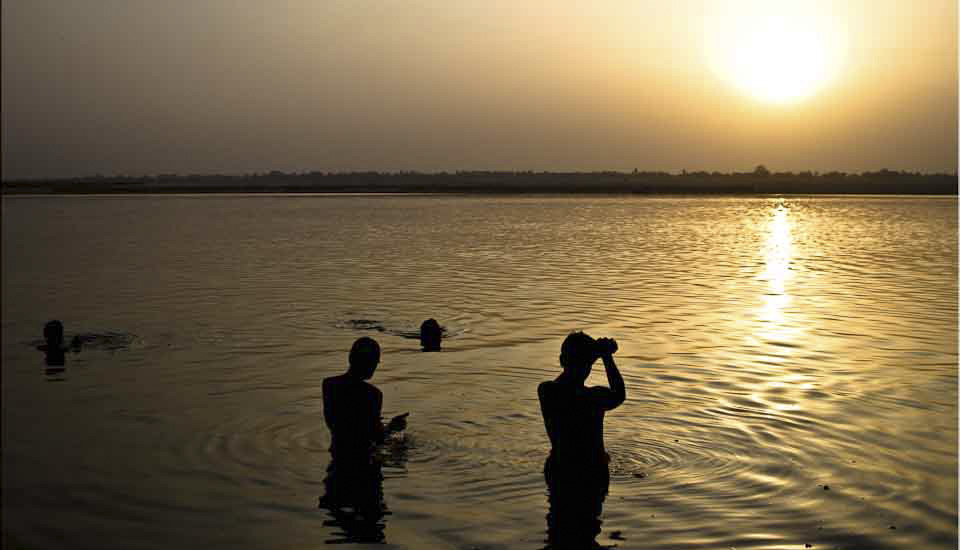.jpg)
Sadhus in Rishikesh
Sādhu – or “Good Men” – are emblematic of India. While they can be seen everywhere, they congregate in holy cities like Rishikesh.
Rishikesh!
For me, that is a name that conjures up the sound of sitars, images of pastel-coloured Hindu Gods, and memories of songs from the Beatles’ post-hallucinogenic phase.
Can you believe it? It was 50 years ago, this February-past, that the Beatles followed their guru – their teacher – Maharishi Mahesh Yogi to his ashram in Rishikesh. With an entourage that included wives, girlfriends and selected reporters, the Fab Four joined students from all around the world – including singer-songwriter Donovan and actress Mia Farrow in an advanced course in the Maharishi’s techniques of Transcendental Meditation.
For the Beatles, the visit to Rishikesh marked their break from hallucinogenic drugs in favour of Indian spirituality and meditation practice. It was a period of great productivity for the band, but was also the beginning of the end – as each member of the group spent time honing his own individual artistic vision.
My visit to this north-Indian city in the Himalayan foothills beside the Ganges River was much more prosaic: I was with photographer Karl Grobl, local guide DV Singh, and a small group of photography-enthusiasts. We had a few afternoon-hours to walk around Swarg Ashram: the traffic-free, alcohol-free and meat-free enclave of temples and ashrams across the famous iron suspension bridges of Ram Jhula and Laxman Jhula from Rishikesh town-proper.
True to my expectations, the air was full of heat and dust, the smell of incense and cattle dung, and the sounds of chanting and sitar music. The streets were lined with shops and shrines and crowded with monkeys, beggars, and mystics.
Come for a walk with me in Rishikesh!
.jpg)
Shiva on the Road
As we leave Haridwar for the short drive upstream along the Ganges to Rishikesh, a giant statue of the Lord Shiva watches over us.
.jpg)
Devotee in the Street
It is not uncommon to find Hindu devotees walking around the streets painted to represent one of the many Gods in their extensive pantheon.

Dressed as a Hindu God
The colour and the facial hair made me think this might be Hanuman, but other features don’t match so I really don’t know. Either way, he was happy to be photographed!

Didgeridoos
I was surprised to see didgeridoos on sale at a local music store.

The Bookstore
This bookshop was cram packed, with many offerings in English and other languages for visitors.

Every Nook and Cranny
Wherever you look, statues, paintings, or other depictions of deities are nestled into every space.

Sādhu
Sadhus are nomadic religious ascetics who have taken vows of chastity and poverty. The ash used in their face paint is sometimes from sacred fires, and is symbolic of their “death” from a worldly life.

Laxman Jhula
The Laxman (Lakshman) Jhula, about 5 kilometres upstream from Rishikesh, is one of two almost-indistinguishable iron suspension bridges across the Ganges to Swarg Ashram where many of Rishikesh’s yoga and meditation centres are located.

Trayambakeshwar from Laxman Jhula
The views from the bridge are wonderful. Trayambakeshwar Temple to the left, is a magnificent 13-story building dedicated to Lord Shiva.

An Indian Couple
Visitors make sure they have their pictures taken as they cross the iconic landmark.

Woman on Laxman Jhula
Many are happy for me to take their pictures as well.

Women on Laxman Jhula

Lord Shiva in the Fountain
According to stories, Shiva the Destroyer (who is one of the Hindu trinity) used to wander as a naked sage, which was somewhat distracting to the wives of several forest-dwelling rishis (hermits). The tiger skin he is often seen with is both a symbol of his animal power (and power over animals) and a means of reducing his distracting magnetism.

Old Man in the Street

Window of Icons
All manner of religious iconography can be found in the shop windows.

Selling Papadum
You are never far from food!

The Papadum Seller
This young woman was so beautiful and had such a lovely smile; I couldn’t help but wonder what her life was like – and what it would have been like if she had been born somewhere else.

Baby Macaque
Small groups of macaques were on the lookout for opportunistic snacks.

Sadhus and Beggers
Sadhus and beggars find shady spots to sit or squat with their bowls or hands out.

Beggars

Brahmā in a Niche

The Chotiwala
For me, one of the most surprising characters in Swarg Ashram was the Chotiwala. Choti is Hindi for a tuft of hair kept at the back of the head that is never cut for religious reasons, so a ‘Chotiwala’ is a ‘Braided Man’. In heavy makeup, the Chotiwala sits in front of the restaurant of the same name, greeting people and ringing the bell over his head.

Chotiwala
Actually, there are two Chotiwala and two Chotiwala Restaurants; they are next door to each other in this small, dark alley in Swarg Ashram. When the original owner died in 1990 and left the business to two sons, they could not get along. So, they split the property down the middle and both operated as if they were the only one. This dispute – and the two painted men sitting on stools smiling and ringing their bells within feet of each other – continues to this day.
So much for the peace and goodwill to be found in a community of gurus, yogis, and meditators!

Home of the Gods

Ram Jhula Bridge
We cross back over the Ganges via the newer suspension bridge – along with pedestrians of all kinds and the odd motorcycle.

Cobras and the Rest
Religious figurines, pendants and various trinkets are laid out to tempt us at the other side.

ॐ – Om
The sacred syllable ॐ – Om – is everywhere around us; sometimes called the “cosmic sound”, it is a spiritual icon in Hinduism, Buddhism, Jainism, and Sikhism.

Rafting on the Ganges
Giving rise to concerns about environmental protection, more tourists are coming to Rishikesh for trekking and rafting. Because the rafting camps are temporary and poorly regulated, they do not have adequate sewage and sanitation infrastructure, causing pollution. And, because the clientele are not there for yoga or meditation, they drink, take drugs, and disturb the tranquility of the forest and the spirituality of the river.

Water Sport on the Ganges
I was amazed when I saw people swimming; these waters originate higher up, in the hills, mountains and glaciers of the Himalaya.
 How I would have loved to escape into one of the many yoga ashrams for a long course of study!
How I would have loved to escape into one of the many yoga ashrams for a long course of study!
I came away from Rishikesh with mere baubles of bright impressions. A full appreciation of this holy centre of yoga- and meditation-study would take much more time.
Maybe one day!
Until then – ॐ – Om!
Photos: 19November2013
































.png)


Beautiful & filled with colour
Thanks! I’d go back any time…